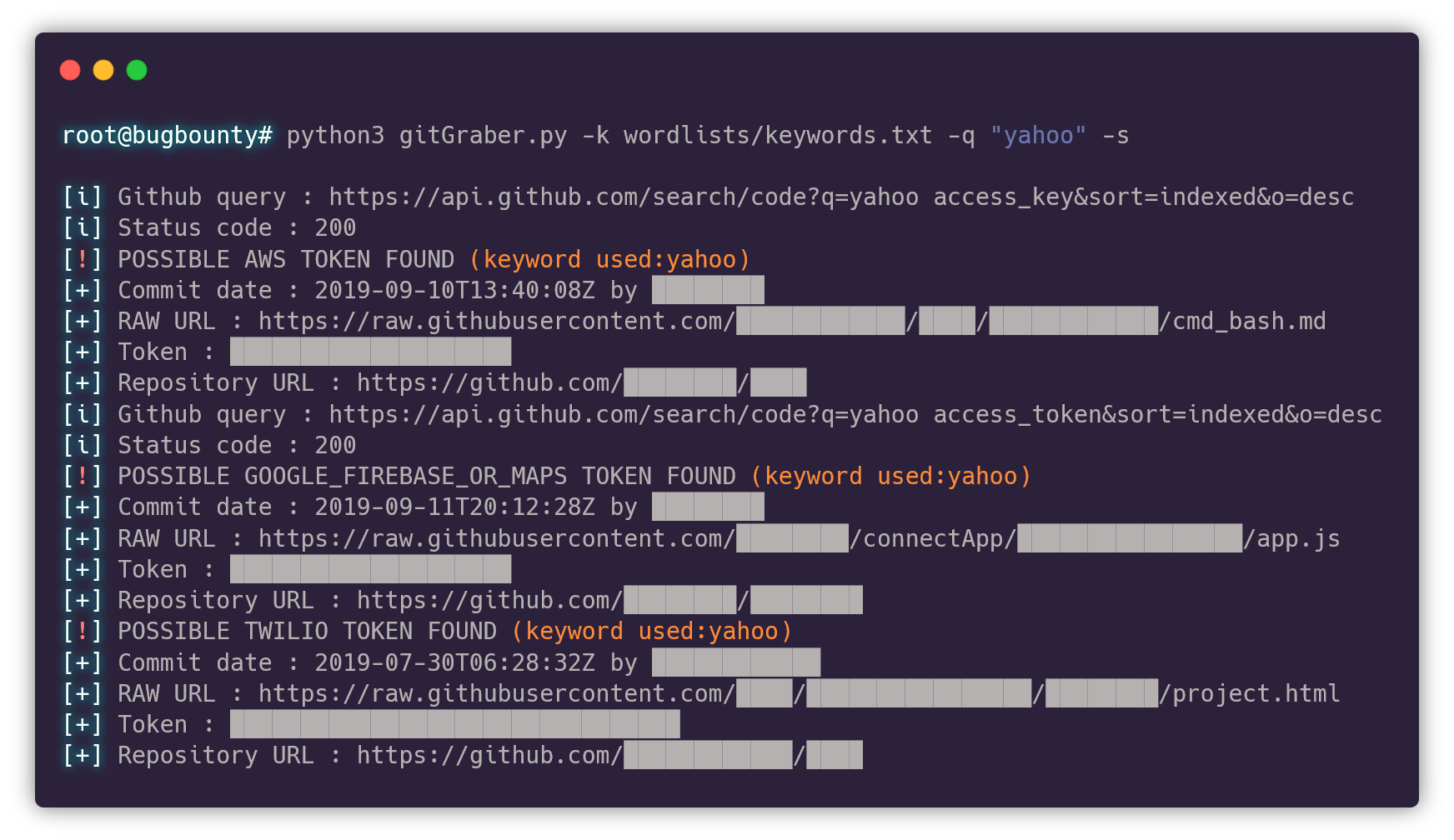gitGraber is a tool developed in Python3 to monitor GitHub to search and find sensitive data in real time for different online services such as: Google, Amazon (AWS), Paypal, Github, Mailgun, Facebook, Twitter, Heroku, Stripe, Twilio…
How it works ?
It’s important to understand that gitGraber is not designed to check history of repositories, many tools can already do that great. gitGraber was originally developed to monitor and parse last indexed files on GitHub. If gitGraber find something interesting, you will receive a notification on your Slack channel. You can also use it to have results directly on the command line.
In our experience, we are convinced that leaks do not come only from the organizations themselves, but also from service providers and employees, who do not necessarily have a “profile” indicating that they work for a particular organization.
Regex are supposed to be as accurate as possible. Sometimes, maybe you will have false-positive, feel free to contribute to improve recon and add new regex for pattern detection.
We prefer to reduce false positive instead of sending notification for every “standard” API keys which could found by gitGraber but irrelevant for your monitoring.
F.A.Q
Why I only see “Github query” and “Status code : 200” in output ?
gitGraber display some things directly in the CLI: GitHub request, status code abuse detection (200 or 403)… and if you don’t see something like [+] POSSIBLE FOO TOKEN FOUND its simply because gitGraber did not find secrets tokens for your defined keyword.
About the error message “Abuse detection reached for token”
This message appears when GitHub detects a large number of requests from your own GitHub token. Don’t worry, gitGraber can handle this and it will try to use another token defined in the config.py file. Note: This is a temporary limit and you don’t need to create another token.
Do I will receive same tokens for same repository every time that I run gitGraber ?
No, to avoid this, gitGraber stores all repository URLs in a file named rawGitUrls.txt. If a repository has already been scanned by gitGraber and found an API key, you will not receive a notification.
How do I set a blacklisted pattern for a specific token ?
You have to edit the tokens.py file and add the pattern as a list argument when initializing the token. FFor example, to add the pattern XXXX to the MAILCHIMP token, the line tokensList.append(Token('MAILCHIMP', 'W(?:[a-f0-9]{32}(-us[0-9]{1,2}))W')) becomes tokensList.append(Token('MAILCHIMP', 'W(?:[a-f0-9]{32}(-us[0-9]{1,2}))W', ['XXXX'])).
Gitrob – Reconnaissance Tool for GitHub Organizations
Usage
usage: gitGraber.py [-h] [-k KEYWORDSFILE] [-q QUERY] [-s] [-w WORDLIST]
optional arguments:
-h, --help Show this help message and exit
-k KEYWORDSFILE, --keyword KEYWORDSFILE Specify a keywords file (-k keywordsfile.txt)
-q QUERY, --query QUERY Specify your github query (-q "apikey")
-s, --slack Enable slack notifications
-tg, --telegram Enable telegram notifications
-w WORDLIST, --wordlist WORDLIST Create a wordlist that fills dynamically with discovered filenames on GitHub
For example, to search for a specific word in github in combination with each word of the file keywordsfile.txt and output it to Slack :
python3 gitGraber.py -k keywordsfile.txt -q YOURWORD -s
It is possible to search for a specific domain name for example, but this has to be surrounded by double quotes :
python3 gitGraber.py -k keywordsfile.txt -q "yahoo.com" -s
If you want to build a custom wordlist based on the files found on Github to use it then with your favorite fuzzing tool, add argument -w :
python3 gitGraber.py -k keywordsfile.txt -q "yahoo.com" -s -w mysuperwordlist.txt
Dependencies
gitGraber needs some dependencies, to install them on your environment:
pip3 install -r requirements.txt
Configuration
Before to start gitGraber you need to modify the configuration file config.py :
- Add your own Github tokens (Personal access tokens) :
GITHUB_TOKENS = ['yourToken1Here','yourToken2Here'] - Add your own Slack Webhook :
SLACK_WEBHOOKURL = 'https://hooks.slack.com/services/TXXXX/BXXXX/XXXXXXX' - Add your own Telegram Config :
TELEGRAM_CONFIG = { "token": "XXXXX:xXXXXXXXXXXXXX", "chat_id": -99999999 }
| Service | Link |
|---|---|
| GitHub | How to create GitHub API token |
| Slack | How to create Slack Webhook URL |
| Telegram | How to create Telegram bot |
To start gitGraber : python3 gitGraber.py -k wordlists/keywords.txt -q "uber" -s
We recommend creating a cron that will execute the script regulary :
*/15 * * * * cd /BugBounty/gitGraber/ &&
/usr/bin/python3 gitGraber.py -k wordlists/keywords.txt -q "uber" -s
>/dev/null 2>&1
Which API Keys & services are supported ? (Last update : September 12th, 2019)
Currently, gitGraber supports 31 different tokens. All of these detection models (regex) are stored in the file tokens.py :
- AWS
- GITHUB_CLIENT_SECRET
- GOOGLE_SECRET
- GOOGLE_URL
- GOOGLE_FIREBASE_OR_MAPS
- GOOGLE_OAUTH_ACCESS_TOKEN
- HEROKU
- JSON_WEB_TOKEN
- MAILCHIMP
- MAILGUN
- PAYPAL
- PRIVATE_SSH_KEY
- PRIVATE_RSA_KEY
- PRIVATE_DSA_KEY
- PRIVATE_EC_KEY
- PRIVATE_PGP_KEY
- PRIVATE_OPENSSH_KEY
- SENDGRID_API_KEY
- SENSITIVE_URL
- SLACK_V2
- SLACK_V1
- SLACK_WEBHOOK_URL
- SQUARE_APP_SECRET
- SQUARE_PERSONAL_ACCESS_TOKEN
- STRIPE_LIVE_SECRET_KEY
- STRIPE_LIVE_RESTRICTED_KEY
- TWILIO_AUTH
- TWILIO_SID
- TWILIO_API_KEY
Wordlists & Resources
Some wordlists & regex have been created by us and some others are inspired from other repos/researchers :







